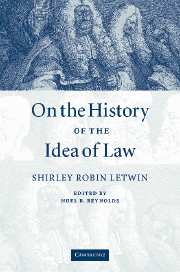Book contents
- Frontmatter
- Contents
- Editor's preface
- Introduction: The idea of law
- Part I Law anchored to a cosmic order
- Part II The Christian revision
- Part III The modern quest
- Part IV The significance of rules
- Part V The idea of law repudiated
- Part VI New foundations
- 15 A skeptical jurisprudence: Michael Oakeshott
- 16 Postscript: Morality, individualism, and law
- Index
16 - Postscript: Morality, individualism, and law
Published online by Cambridge University Press: 22 September 2009
- Frontmatter
- Contents
- Editor's preface
- Introduction: The idea of law
- Part I Law anchored to a cosmic order
- Part II The Christian revision
- Part III The modern quest
- Part IV The significance of rules
- Part V The idea of law repudiated
- Part VI New foundations
- 15 A skeptical jurisprudence: Michael Oakeshott
- 16 Postscript: Morality, individualism, and law
- Index
Summary
The current repudiation of the idea of law is, as we have seen, at the same time a repudiation of individualism, which is justified as a defense of morality. We are told that if we favor compassion and altruism, rather than the ruthless pursuit of self-interest, we must reject the idea of law as a set of fixed rules designed to make possible an association of people who wish to shape their own lives and pursue their own projects. The traditional idea of law is said to be acceptable only to ruthless individualists who recognize no concern or responsibility for maintaining a decent communal life and securing the well-being of their fellow men.
This way of understanding individualism and the relation between the traditional idea of law and morality arises from a gross confusion. It began with the conclusion that because Hobbes had rejected the ancient and medieval view that linked morality to the governing principle of the cosmos, his idea of law is an amoral concept. The confusion was exacerbated by the message drawn wrongly from Bentham's utilitarianism, that individualism consists in advocating the heartless pursuit of self-interest. In reaction against that message, the opponents of individualism who became influential in the course of the nineteenth century equated morality with altruism or selflessness and contrasted it to individualistic selfishness. Consequently, the moral life came to be understood as a progress of altruism ascending to self-sacrifice.
- Type
- Chapter
- Information
- On the History of the Idea of Law , pp. 326 - 346Publisher: Cambridge University PressPrint publication year: 2005



